Kevin Clarke
Operetta Research Center
7 August, 2014
A soprano with a bomb in her handbag, with which she intends to blow up the male lead? That’s certainly not something you get every day in operetta. But it’s exactly what happens in Emmerich Kalman’s 1912 Der kleine König, premiered in Vienna at the Theater an der Wien, with the then stellar cast of Mizzi Günther and Louis Treumann. (Yes, the original Danilo and Hanna Glawari.) He played the King of Portugal, she a diva-with-a-vengeance, ready to start a political uprising by blasting the monarch away and handing over power to the people. You could say that Kalman, decades before Stephen Sondheim, wrote a “musical thriller,” that the Ohio Light Opera revived for the first time in nearly a hundred years.
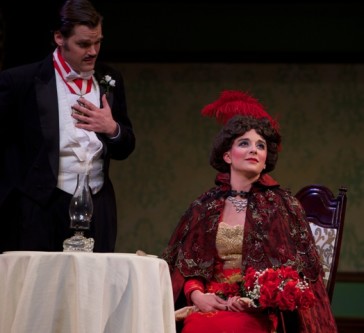
An explosive rendezvous: Natalie Ballenger as Anetta Montarini and Clark Sturdevant as the King. (Photo: Matt Dilyard/OLO)
As Michael Miller writes in his program notes, the real life story this operetta is based upon made headlines around the world. It was so juicy that it could not possibly have escaped the attention of the operetta world. A nineteen-year-old boy king falls madly in love with a celebrated French “chanteuse” and showers her with non-stop gifts, including a $70,000 pearl necklace following their initial meeting. Her career skyrockets, but that of the king fizzles. A revolutionary uprising forces him into exile, the singer moves onto Broadway but stays in friendly contact with the ex-monarch.

Gaby Deslys (1881-1920), a danseuse, from Marseilles, France.
The king was Manuel II of Portugal, the singer was Gaby Deslys. And the operetta that their 1909-1912 romance inspired was Kalman’s Der kleine König for which the composer collaborated with librettist Robert Bodanzky – himself an “anarchist communist.” Bodanzky originally became famous for his apolitical poems, but turned to openly writing political essays and plays after WW1. He died shortly afterwards, in 1923. (His brother Arthur Bodanzky is the famed Metropolitan Opera House conductor.)
There is a recent article on Bodanzky in Werner Portmann and Siegbert Wolf’s book „Ja, ich kämpfte“. Von Revolutionsträumen, ‘Luftmenschen’ und Kindern des Schtetls. The title gives you a pretty good idea where to place Bodanzky, politically. And it is somewhat amazing that in times of severe censorship in Austria Bodanzky got away with a story like Der kleine König in 1912.
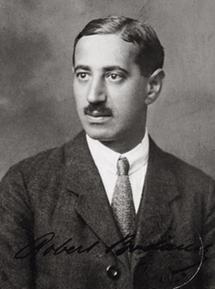
Kalman’s librettist Robert Bodanzky.
Bodanzky gives a new twist to the then well-known real-life events: his King of Portugal falls in love with a singer re-named Anetta Montarini, in town to perform Carmen. Miss Montarini is the daughter of a fabled revolutionary who was killed by the king and has since been regarded as a martyr. She intends to revenge her father’s death by accepting an invitation to the king’s palace, carrying a bomb in her handbag, hidden under a bouquet of red roses. She lights the fuse of the bomb, places it under a table during their rendezvous, and intends to run after a first sip of champagne. But then, to her surprise, she realizes that the king is not the monster she thought he would be. Instead, he turns out to be a very charming man, caught in a web of court etiquette and intrigue.
When she realizes this, she breaks the promise she gave to the revolutionaries in a rousing chorus number (“Freedom’s Song”), and stops the bomb from going off.
She also stops the revolutionaries from killing the king in act 2, as they storm towards the castle. Instead, she helps him abdicate with dignity, and accompanies him into exile on a little island near the coast of England, where they live happily ever after; as do the Portuguese people with their newly elected democratic government.
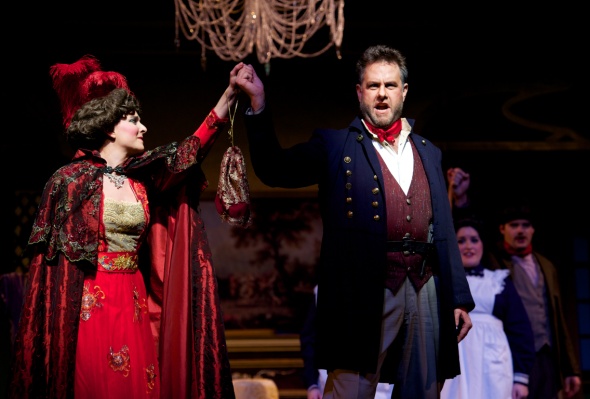
Natalie Ballenger as Anetta Montarini leads the revolutionaries to battle with a “Freedom’s Song” in act 1. (Photo: Matt Dilyard/OLO)
In Ohio, artistic director Steven Daigle opted for a surprisingly “standard” staging of this piece, allowing his lead players Clark Sturdevant as the King and Natalie Ballenger as Anetta to mostly stand around in uniform and ball gown, and play-act “traditionally.” The thriller elements of the plot, and the political dimensions of the story, are downplayed, except where Kalman has actual revolutionaries marching onto the stage demanding freedom for Portugal, a group lead by Daniel Neer as Admiral Montbrison. Together with Anetta he sings “For Freedom and Fatherland” (“The people will unite/and join a daughter’s fight. / The battle starts tonight.”)
It’s as if you see/hear “Les Miserables” foreshadowed by 70 years, and the Ohio soldiers and revolutionaries look just as attractive as their musical counterparts on Broadway or the West End did in the later show; only the waving of the flags was missing, and the barricades.
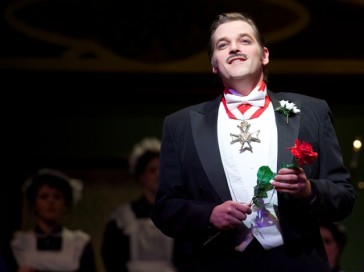
Tenor Clark Sturdevant with the red rose, as a “Rosenkavalier” reference. (Photo: Matt Dilyard/OLO)
If I had not seen the same lead actors in a later and different production demonstrate that they can portray highly energetic characters and sing with a very wide range of vocal coloring, I would have thought – judged by the Little King performance – that they are simply “singers” untrained to act in any modern sense of the word. But that is, as it turned out, not true. The problem seems to be that in their head they have the notion that Kalman and “Romantic Operetta” needs to be played in this stilted way, instead of the vaudeville approach to operetta they offered a day later in Victor Herbert’s Dream City production.
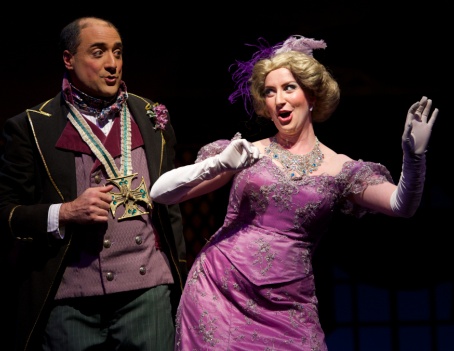
A great comic duo: Gretchen Windt as the naughty Zaza, and Anthony Maida as the poor poet Huck. (Photo: Matt Dilyard/OLO)
There to remind the audience that Kalman is not just a “romantic” composer but a topical and contemporary one, from a 1912 perspective, was the comedy duo of Zaza and Huck, originally played by the eccentric dance-buffo Ernst Tautenhayn and Louise Kartousch, now sung by the perky Gretchen Windt and Anthony Maida as a poor poet suddenly elevated to royal favors by a whim of fortune. (Mr. Bodanzky might have intended this as a sort of self-portrait.)
Maida managed to conjure up memories of Mr. Tautenhayn and bring some of the mad-cap humor his predecessor was famous for to the production, that could have used more of it elsewhere.

One of operetta history’s first (and most famous) “wet dream leading men”: Louis Treumann as Danilo.
Still, the basic plot was clearly outlined, even if Miss Ballenger did not (!) light the fuse of the bomb under Mr. Daigle’s direction. She nevertheless sang beautifully, and I am sure that there could be more electrifying chemistry between the attractive soprano and the equally attractive Mr. Sturdevant if they both wanted to turn to heat up a notch. Because the original king, Louis Treumann, was not only famous for his grotesquely funny acting/singing style, but also for his highly erotic stage presence, noted in nearly every review of the Merry Widow a few years earlier. You can sense Kalman using that eroticism at the end of act 1, where he ironically references Richard Strauss’ “operetta” Der Rosenkavalier act 1 finale: “Anetta exits slowly via the stairs, turning back to the king before she departs. Looking after her, the king kisses the rose Anetta left him. The curtain falls very slowly.”
Musically, Kalman tried new things too. In act 3 he introduces the tango to the world of operetta, which admittedly sounds more like a syncopated czardas but was still novel enough for its time. (From there, Kalman went on his merry way to familiarize himself with exotic dances from abroad, later making him one of the star composers of Shimmies, foxtrots and Charleston.)
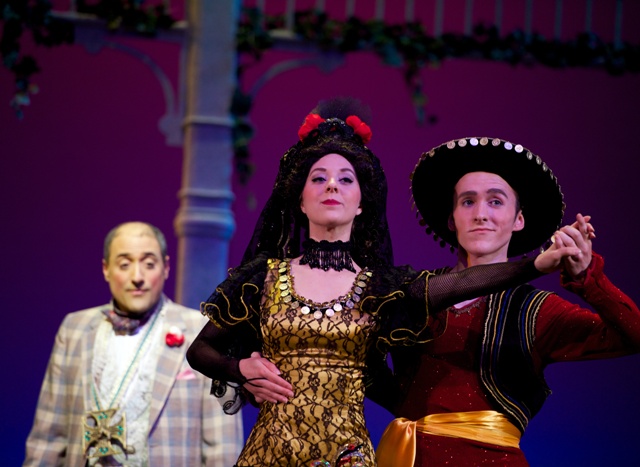
The tango scene from act 3: “Laughter Fills Your Heart.” (Photo: Matt Dilyard/OLO)
Conductor Steven Byess did a great job in keeping the score moving forward, but did not invest noticeable energy in making the edgy side of Kalman’s music evident. His reading was more “lush” than “revolutionary.” But, in all fairness, that’s one possible interpretation of the piece; hopefully, in the future, there will be others too, if this OLO production stirs wider interest in the show.

The abdication scene, in act 2, where the king (Clark Sturdevant) leaves his country to go into exile – with his dog. (Photo: Matt Dilyard/OLO)
Der kleine König has not been seen or heard in the USA since 1921, when it was produced in Hungarian at the Yorkville Casino, New York. For Ohio, Steven Daigle prepared a new English translation from which all of the above quotes are taken. His performance edition is available through OLO.
The show has, so far, not been recorded, except for two comedy numbers featuring Louise Kartousch and Ernst Tautenhayn, back in 1912. The grand waltz duet from act 2, “Lieblich spielen die Geigen” – which had to be repeated three times at the world premiere – went unrecorded with the rest of the material because the two original stars, Günther and Treumann, left the production after a quarrel with the management, right after the first night, causing one of the greatest theater scandals in Viennese operetta history. For details, read the Kleiner König chapter in Stefan Frey’s newly translated Kalman biography.
That chapter is headed with a quote from Viennese critic Julius Stern, who wrote about Der kleine König: “The finales more than once foreshadow the end of the world.”

Newspaper ad for the 1916 film version of “The Red Widow.”
This summer, the Salzburg Festival presented a staging of Karl Kraus’s famous end-of-the-world WW1 play, Die letzten Tage der Menschheit. It’s interesting to compare the Kalman/Bodanzky operetta to this show. Also, to compare it to the operetta The Red Widow by Channing Pollock and Rennold Wolf, with a score by Charles J Gebest. It also has a heroine with a bomb in her pocket. It premiered at the Astor Theatre, New York, in November 1911 – a year before Der kleine König was written. (It was turned into a movie, starring John Barrymore, in 1916.)

Grecthen Windt and her dashing soldiers, in an act 1 dance scene. (Photo: Matt Dilyard/OLO)
A CD version of the OLO production will be available towards the end of 2014. Hopefully Stefan Frey will narrate the fascinating story of Bodanzky, Gaby Deslys, the $70,000 pearl necklace, the Portuguese revolution and everything else in the booklet, as he did in a talk given during the symposium “Taking Light Opera Seriously” at OLO.
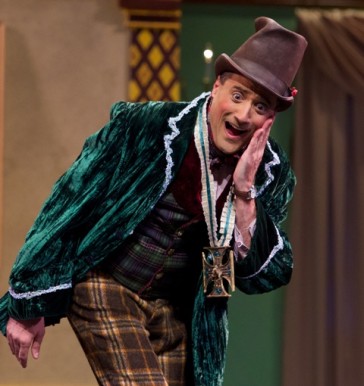
Anthony Maida evoking the grand Viennese comedy tradition as the poor poet Huck in “The Little King.” (Photo: Matt Dilyard/OLO)
Der kleine König/The Little King is a show well worth hearing and knowing, if you want to explore operetta history that goes beyond “flowing champagne, ceaseless waltzing, Graustarkian uniforms and glittering ball gowns, sentiment and Schmaltz,” to quote Richard Traubner and his definition of the genre in Operetta: A Theatrical History (revised 2003). Kalman and Bodanzky show that there can be more than that to operetta. If we are lucky, some of their explosive interpretation of the art form will be heard on the highly anticipated CD version of The Little King!

This was a fascinating piece to see … I’m sure it will be taken up elsewhere…
Gaby’s sea star costume in the video clip is amazing, her gymnastics with ??? (The king of Portugal?) are equally interesting to see. A great performer, no doubt. Thanks for sharing this.
As someone who also saw this performance, I can only
agree with Kevin’s insights, and also would love to see it again, done with more of a “revolutionary edge”. But the Ohio group
deserves to be thanked: not just for putting on these wonderful performances, but in the excellence of the recent symposium.
Excellent review. But even if the production was missing some of the requisite revolutionary edge — and yes, leaving out business of lighting the bomb’s fuse certainly detracted from the tension of the lengthy scene between the King and Anetta — the music, on its own terms, was pretty stunning. Kudos to OLO for mounting it, and yes, can’t wait for the coming CD!